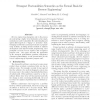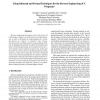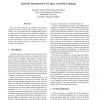42 search results - page 2 / 9 » Reverse Engineering of Legacy Code Exposed |
WCRE
1995
IEEE
13 years 8 months ago
1995
IEEE
Reverse engineering of program code is the process of constructing a higher level abstraction of an implementation in order to facilitate the understanding of a system that may be...
WCRE
1997
IEEE
13 years 8 months ago
1997
IEEE
Reverse Engineering is focused on the challenging task of understanding legacy program code without having suitable documentation. Using a transformational forward engineering per...
ICSM
2000
IEEE
13 years 9 months ago
2000
IEEE
Several reverse engineering methods for recovering objects from legacy systems have been proposed in the literature, but most of them neglect to identify the relationships among t...
ICSM
1996
IEEE
13 years 9 months ago
1996
IEEE
Reverse engineering of program code is the process of constructing a higher level abstraction of an implementation in order to facilitate the understanding of a system that may be...
WCRE
2005
IEEE
13 years 10 months ago
2005
IEEE
We apply static analysis and symbolic interpretation techniques to reverse engineer the semantics of legacy assembler code. We examine the case of IBM-1800 programs in detail. Fro...



